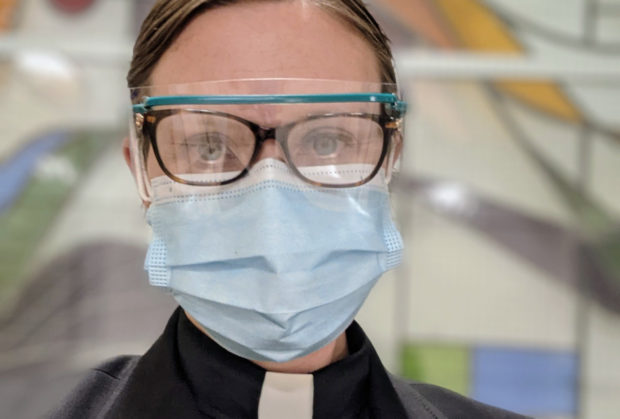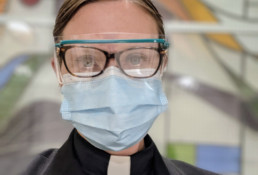“The Whole Situation was Soaked in Love”
“The Whole Situation was Soaked in Love”
Lucy Soucek

When Hope Fried first received the text from her staff chaplain, she burst into tears. Pacing her Manhattan apartment, her mind was racing. It was spring of 2021 and she was working the on-call shift of her chaplaincy residency at nearby Mt. Sinai hospital. The message came in at around nine in the evening explaining that a mother in the labor and delivery unit was preparing to give birth to a baby either stillborn or expected to pass away soon after birth. The mother was Roman Catholic, Spanish speaking, and she was asking for her child to be baptized.
Fried, 32, is Jewish. Normally, she would have called for a Catholic priest to conduct the baptism, but this was during the overnight shift. If the baby was born alive and they waited for the priest to make it over to the hospital, they ran the risk that the baby might die before the priest arrived.
Fried wasn’t allowed at the hospital during the overnight shift because of Covid restrictions. She had never been to a Catholic baptism, and now she would have to talk a doctor or a nurse through one from her living room on the phone in Spanish in the middle of the night during a pandemic. After her initial bout of panic, she realized that she had a choice to make. And that choice was experienced by many chaplains over the past year and a half.
“COVID made it so that in the times where you would call for a priest or you'd try to call for an Imam, that wasn't available,” said Fried. “So it asked more of us because just the logistics weren't really possible. I think a lot of chaplains were like, okay, we just have to show up with our full humanity.”
In hospitals across New York City, pandemic restrictions have forced chaplains to navigate novel and potentially uncomfortable situations in their attempts to administer care. But what has guided them through the last year and a half is training that prepares them to honor the belief systems of their patients, even when those belief systems are dramatically different from their own. Now, chaplains and chaplain educators are focusing on how to care for themselves so that they can care for others as they continue to practice both in person and remotely.
For Fried, growing up in a multi-religious household influenced her eventual path to chaplaincy. Her mom is Catholic and her dad is Jewish. Ever since she was young, she’s felt more connected to Judaism, although she’s never had a strong belief in God. That’s where her humanism comes in. She identifies as a Jewish Humanist, which means she is ethnically Jewish, but in terms of spiritual beliefs, she doesn’t believe in a higher power.
When deciding what she wanted to pursue in her career, religion felt important. She thought, if she was meant to become a rabbi, God would reach out. But that just never happened. And so she turned to chaplaincy. It was a way for her to still feel connected with her faith, despite not believing in a higher power, and it allowed her to just sit with people and help them navigate hardships.
“I thought, ‘maybe I should try chaplaincy,’” said Fried. “It doesn't have to be super religious, but you get to be with people; you get to accompany people.”
She attended Union Theological Seminary, graduating in the spring of 2020. After taking four units of Clinical Pastoral Education to become board certified and participating in a yearlong residency. She is now a staff chaplain at the Hospital for Special Surgery in Manhattan.
It was during her residency that she navigated the baptism. And so on that night, Fried spoke with the doctor, who also happens to be Jewish, and they decided to make it happen. “We were both very firm,” Fried said. “I remember that feeling of being really grounded in our intention of like, we've been asked to do this; we are going to do this.”
After they made the decision, it was all about talking through logistics. Fried’s staff chaplain and clinical supervisor emailed her a guide to performing an emergency baptism, with details outlining the protocol, sample prayers and information on how to provide support over the phone.
She didn’t know Spanish, so she pulled up YouTube videos and practiced it with her husband over and over again, then walked the doctor through the ritual instructions on the phone. The doctor would need a little pill cup of sterilized water, which would act as holy water. Typically, holy water is water that has been blessed by a member of the clergy, but in the hospital, the protocol is different.
Dabble water on the baby’s forehead, and say:
“[Patient’s name,] Bautizo a ti en el nombre del Padre,” [I baptize you in the name of the Father].
Drop of water.
“y del Hijo.” [and the Son].
Drop of water.
“Y del Espiritu Santo,” [and the Holy Spirit].
Drop of water.
“Amen.”
The baby was born at around 4:30am, alive. A nurse performed the baptism, though Fried doesn’t know their personal religion or language preference. And then, at 4:45am, Fried called the on-call priest to come to the hospital to bless the baby and provide an official document. The baby survived for a couple of hours and then died later that morning.
In the Catholic church, baptism is seen as a way to cleanse infants from the original sin they were born with, and to welcome them into the Catholic faith. So Fried says the family was deeply appreciative that they were able to perform the ritual and receive the certificate.
“I think sometimes we attend to the worst moments in people's lives,” said Fried. “We try to be present and accompany and we try to lessen, slightly, their spiritual distress, and I think having their baby baptized was able to slightly lessen some of that spiritual distress.”
Throughout this whole situation was the tension between Fried’s Jewish Humanism and the Catholic ritual that she was being asked to lead someone through. But Fried, relying on what she learned about being a hospital chaplain where they often have to navigate interfaith situations, thinks of it as an expression of love.
“If a family has this request and this is their ultimate expression of love and will provide some sense of spiritual relief to know that their baby has been baptized and blessed by God and will be accepted into heaven, I think that's an ultimate expression of love and I will perform it,” said Fried.
Hospital chaplains navigate these complicated situations every day, but many also benefit from a system of training called Clinical Pastoral Education that is in place to guide them. During her yearlong residency, Fried was guided by her education supervisor, Rev. David Fleenor. He is the director of education for the Center for Spirituality and Health and the Assistant Professor of Medical Education at the Icahn School of Medicine at Mt. Sinai. He is also ordained as an Episcopal priest.
One idea that Fleenor, 46, taught Fried to keep at the forefront of her mind was to think about the context of the situation and how that determines her role as the chaplain. For Fried, the pandemic, the timing of the birth, the support she received from educators and other chaplains, and the importance of this ritual to the family all drove her decision to make sure it would happen.
“The whole situation was soaked in love,” Fleenor said. “People have their own convictions, but the beautiful work that she did was to dig deeper within herself and find that love was a deeper value; that love and care and compassion compelled her more to facilitate this meaningful ritual for this family, at such a profound time of loss in their life.”
Profound loss was ubiquitous throughout the pandemic. And hospital chaplains spent much of their time caring for not only patients and families, but staff as well. At Mount Sinai, chaplains had the option to administer care throughout the pandemic in person, and many did. Fleenor said their role of caring for staff at the hospital was vital and is too valuable for the field to be replaced by services done over the phone.
“What happens with chaplains is that they are embedded on units and they walk around and staff informally say, ‘Man I'm really struggling,’” said Fleenor. “They're not necessarily gonna reach out to the employee assistance program. But when the chaplain happens to be there, then they open up.”
But to be able to provide staff support, hospital chaplains also need to know how to take care of themselves.
At Robert Wood Johnson University Hospital in New Brunswick, New Jersey, the staff chaplains were able to administer care in person throughout the pandemic, just not in the rooms of COVID-19 patients. Figuring out how to sustain care and avoid compassion fatigue is now one of their primary concerns.
“It’s like everyone's taking a vacation or is sick or something,” said Rev. Christine Davies, ordained Presbyterian minister and the director of pastoral care at Robert Wood Johnson. “They're all dropping like flies just because of the sheer amount of suffering that they witnessed; It’s unparalleled. And so I think they’re still carrying a lot of that.”
Davies, 38, teaches Clinical Pastoral Care Education courses as well, and she says that much of what she teaches her students has to do with learning how to maintain their own emotional wellbeing so that they can care for others. Especially after this past year.
“Even right now, when we're not in a surge, I'm cognizant of my students’ cumulative exhaustion since the pandemic started,” said Davies. “A lot of it is helping them to see and acknowledge and be aware of their own feelings and emotions so that they can honor the emotions in others.”
For Fried, practicing chaplaincy during the pandemic will stay with her for a long time, and she’s learned to recognize when she might not be able to give the care she wishes she could. “I think it just really made me aware of how long lasting the intensity of the pain that we're asked to witness and hold is, and that that can become sort of ingrained in your body and needs to be processed over a longer period of time,” Fried said.
When she got home from her shift the day after the baptism, her husband ordered her favorite takeout dish, Pad Thai, and she spent the afternoon watching The Real Housewives and taking moments to cry. Fleenor and she have a running joke that she’s the crying chaplain.
“Your body needs to release the anguish and the fear and uncertainty,” Fried said. “All that needs to come out, and my way is through crying.”

